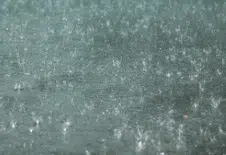The etymological origin of the term rain is found in Latin. Specifically, it emanates from the word “pluvia” which, in turn, emanates from the verb “pluere” which can be translated as “rain.”
Rain is the act of raining : the fall of water from the clouds . The term also refers to said water itself.
 For example: “Heavy rain is forecast for tomorrow throughout the province,” “We were playing in the park when the rain surprised us and we had to return home,” “The rain caused serious flooding in the northern part of the country.”
For example: “Heavy rain is forecast for tomorrow throughout the province,” “We were playing in the park when the rain surprised us and we had to return home,” “The rain caused serious flooding in the northern part of the country.”
It can be said that rain is a meteorological phenomenon . In the atmosphere there is always water in the form of vapor: when that vapor condenses, clouds are formed, which are small droplets suspended in the air. For different reasons, this water can precipitate to the surface , generating rain.
If the atmosphere cools, for example, it loses its ability to transport vapor and precipitation occurs. Both temperature , atmospheric pressure and humidity affect rainfall, which is measured in millimeters . When the diameter of the droplets is very small, it is called drizzle .
It is important to highlight that rain has great relevance for ecology . The water that falls from the clouds favors the growth of plants, increases the flow of rivers and infiltrates the soil to end up in natural deposits or form underground currents. However, if the rains are excessive they can cause flooding .
In the same way, we cannot ignore the existence of what is known as acid rain . This is produced by a chemical reaction and is formed when certain compounds are released into the air, such as sulfur dioxide, nitrogen oxide and even sulfur trioxide. Compounds that are emitted by vehicles or factories of different types as well as thermal power plants, for example.
The aforementioned type of rain can lead to serious negative consequences for the environment. And it can cause the decomposition of the vegetation. Not to mention the acidification of lakes, serious damage to forests, severe damage to crops and even harmful effects on human health.
Staunch defenders of the natural environment do not hesitate to try to raise awareness among the population of the dangers of acid rain and even take measures to prevent it. Thus, for example, they instill that the best way to stop it is by reducing polluting emissions.
In colloquial language, on the other hand, rain is referred to as a high amount or abundance of something: “The government promised a shower of investments for next year,” “The police were received by the protesters with a shower of stones.” ” .
In addition to everything indicated, we cannot ignore that “La Lluvia” is also the title of a song by the Spanish singer María Villalón. Specifically, it is the single that presented his first album in 2009, which was called “The roofs where we were more than friends.”
